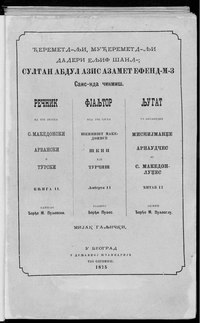Quick Facts
Biography
Georgi Pulevski, sometimes also Gjorgji or Gjorgjija Pulevski (Macedonian: Ѓорѓи Пулевски or Ѓорѓија Пулевски, Bulgarian: Георги Пулевски; 1817–1895) was a writer and revolutionary, known today as the first author to express publicly the idea of a Macedonian nation distinct from Bulgarian, as well as a separate Macedonian language.Pulevski was born in 1817 in Galičnik, then under the rule of the Ottoman Empire, and died in 1895 in Sofia, Principality of Bulgaria. Trained as a stonemason, he became a self-taught writer in matters relating to Macedonian language and culture. In Bulgaria he is regarded as a Bulgarian and early adherent to Macedonism.
Early life
Pulevski was born in the Mijak tribal region. According to one view, the surname is of Vlach origin, as is the case with several other surnames in Mijak territory, pointed out with the Vlach suffix -ul (present in Pulevci, Gugulevci, Tulevci, Gulovci, Čudulovci, etc.), however, those families espoused a Mijak identity, and had no ties to the Aromanian (cincar) community. According to one source, Pulevski's ancestors settled Galičnik from Pula, a small maritime town south of Shkodër, at the end of the 15th century, hence the surname Pulevski. Pulevski himself identified as mijak galički (a "Mijak from Galičnik", 1875).
As a seven-year-old, he went with his father to Romania on seasonal work (pečalba). According to popular legends in his youth, Pulevski wasengaged in a hajduk in the area of Golo Brdo.
Military activity
In 1862, Pulevski fought as a member of the Bulgarian Legion against the Ottoman siege at Belgrade. He also participated in the Serbian–Ottoman War in 1876, and then in the Russo-Turkish War of 1877–78, which led to the Liberation of Bulgaria; during the latter he was a voivode of a unit of Bulgarian volunteers, taking part in the Battle of Shipka Pass. After the war, he went to live in the newly liberated Bulgarian capital Sofia. He also participated as a volunteer in the Kresna-Razlog Uprising (1878–79), which aimed at unification of Ottoman Macedonia with Bulgaria. In an application for a veteran pension to the Bulgarian Parliament in 1882, he expressed his regret about the failure of this unification. From 1883 Pulevski finally received a government pension in recognition of his service as a Bulgarian volunteer, until his death in 1895.
Works
In 1875, he published in Belgrade a book called Dictionary of Three Languages (Rečnik od tri jezika, Речник од три језика). It was a conversational phrasebook composed in "question-and-answer" style in three parallel columns, in Macedonian, Albanian and Turkish, all three spelled in Cyrillic. Pulevski chose to write in the local Macedonian rather than the Bulgarian standard based on eastern Tarnovo dialects. His language was an attempt at creating a supra-dialectal Macedonian norm, but with a bias towards his own native local Galičnik dialect The text of the Rečnik contains programmatic statements where Pulevski argues for an independent Slavic Macedonian nation and language.
What do we call a nation? – People who are of the same origin and who speak the same words and who live and make friends of each other, who have the same customs and songs and entertainment are what we call a nation, and the place where that people lives is called the people's country. Thus the Macedonians also are a nation and the place which is theirs is called Macedonia.
His next published works were a revolutionary poem, Samovila Makedonska ('A Macedonian Fairy') published in 1878, and a Macedonian Song Book in two volumes, published in 1879 in Belgrade, which contained both folk songs collected by Pulevski and some original poems by himself.
In 1880, Pulevski published Slavjano-naseljenski makedonska slognica rečovska ('Grammar of the language of the Slavic Macedonian population'), a work that is today known as the first attempt at a grammar of Macedonian. In it, Pulevski systematically contrasted his language, which he called našinski ("our language") or slavjano-makedonski ("Slavic-Macedonian") with both Serbian and Bulgarian. All records of this book were lost during the first half of 20th century and only discovered again in the 1950s in Sofia. Owing to the writer's lack of formal training as a grammarian and dialectologist, it is today considered of limited descriptive value; however, it has been characterised as "seminal in its signaling of ethnic and linguistic consciousness but not sufficiently elaborated to serve as a codification", In 1892, Pulevski completed the first Slavjanomakedonska opšta istorija (General History of the Macedonian Slavs), a largemanuscript with over 1700 pages. In his last work: “Jazitshnica, soderzsayushtaja starobolgarski ezik, uredena em izpravlena da se uchat bolgarski i makedonski sinove i kerki"; ('Grammar, containing Old Bulgarian language, arranged and corrected to be taught to Bulgarian and Macedonian sons and daughters'), he considered the Macedonian dialects to be old Bulgarian and the differences between the two purely geographical.
Identification
The definition of the ethnic Macedonian identity arose from the writings of Georgi Pulevski, who identified the existence of a distinct modern Macedonian language and nation. Pulevski summarized the folk histories of the Macedonian people and concluded that the Macedonians were descendants of the Ancient Macedonians. This opinion was based on the claim that the ancient Macedonian language had Slavic components in it, and thus, the ancient Macedonians were Slavic, and that modern Macedonians were descendants of them. However, his Macedonian self-identification was ambiguous. Pulevski viewed Macedonian identity as being a regional phenomenon, similar to Herzegovinians and Thracians. He also sometimes described himself as a "Serbian patriot", but he also viewed his ethnic designation as "Bulgarian from the village of Galičnik". Pulevski's different identifications actually revealed the absence of a clear ethnic identity among part of the local Macedonian population at that time.
List of works
Sources
- Daskalov, Rumen; Marinov, Tchavdar (2013). Entangled Histories of the Balkans: Volume One: National Ideologies and Language Policies. BRILL. ISBN 978-90-04-25076-5.CS1 maint: ref=harv (link)

